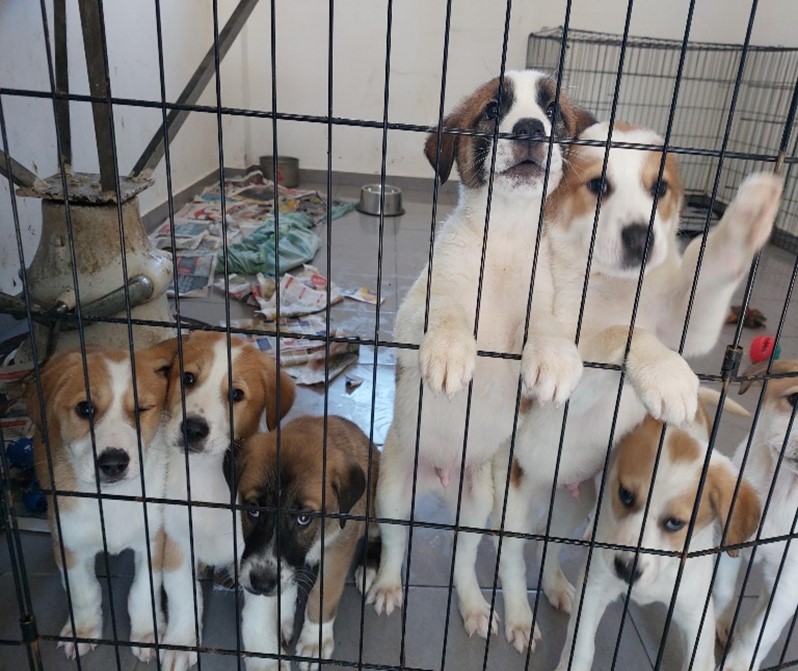Immunizations
Parvovirus (Canine Parvovirus-cpv) Vaccine:
an inoculation against a common and deadly illness in pups, given from 6 weeks up to 16 weeks.
Multivalent Vaccine (dhlpp)
: a vaccine that contains protection against 6 contagious diseases (among them also Parvo) that are dangerous for pups and adult dogs. The vaccine is given the first time at the age of 6 to 8 weeks and must be repeated twice after two-weeks gaps (all together a series of 3 multivalent Vaccine shots). Afterwards, or when referring to a dog above 1 year old, the vaccine is given once a year.
Rabies Vaccinations:
an obligatory vaccine for all dogs that are 3 months old against the rabies disease which is contagious also to humans. The vaccination is given once a year. With the first rabies vaccine it is obligatory to inject an electronic chip into the dog, which is done only once in the dog’s life.
Vaccination against Esophagus Worms/Park Worms (Spirocerca Lupi):
in actuality this is not a vaccination but a preventive treatment for specific worms that can cause death by tearing the main artery-aorta and by migrating to the esophagus and there causing tumors that can develop to cancer.
Treatment for worms:
Treatment for worms is possible with pills or injections. Dogs suffering from worms should be given an injection or a pill, to be repeated after 10 days. This treatment is recommended for all puppies. Adult dogs that do not suffer from worms should be given an injection or a pill once every six months. Dogs suffering from worms tend to itch on their hindquarters and therefore it is important to pay attention to this, as well as finding worms in the feces.
Fleas and Ticks
Fleas and ticks are not only a bothersome aesthetic problem. It is important to remember that in addition to danger of their being blood suckers, they spread many dangerous diseases to your dogs, some of which are contagious to humans. Regular treatment of all house animals and treatment of the yard is the only way to get completely rid of them.
Preventive treatment for fleas:
ampoules/spray once a month. The contents of the ampoules should be sprinkled on the skin of the dog’s nape or between the shoulder blades (the place the animal cannot reach with its tongue) and one has to be certain that the skin is dry before sprinkling. The liquid is absorbed by way of the skin into the blood and provides protection against flees for a month. After washing the dog, the procedure should be repeated 3-4 days after the bath. Care should be given to do treatments once a month throughout the year, and it is important to make note of the age and weight of the dog in order to prevent overdosing.
Preventive treatment for ticks:
during the Spring- and Summer-months it is advisable to put an anti-flea collar on the dog. The collar is affective for 4 to 6 months. Try not to get the collar wet, and be careful to wash hands after touching it.
Showering
If your dog is clean it does not need regular showers. Frequent showers damage the natural protective layer of the dog’s skin, and even causes increased hair loss, dandruff, itching, rashes and unpleasant odors. It is recommended to wash your dog once every six months and to use a shampoo made especially for dogs. In the event there is no choice (such as after bathing in the sea) rinse the dog off without shampoo.
Food
The nutrition of the dog has a direct influence on its health, and therefore it is recommended to buy quality food that can save your dog from various health problems, and save you the expenses of future treatments. Food should be adjusted to the age and weight of the dog as written on the package, and not simply according to the recommendation of the salesperson at the pet store, since he is not a veterinarian. Recommended firms that manufacture dog food are Bil.Jac, Science Diet, Royal Canin, Pro Plan, Nutro Choice. Puppies up to half a year old should be given 4 meals a day; from half a year to one year – 3 meals a day; from one year and up – 2 meals a day.
Dog food contains all the components that your dog needs, therefore, it is not recommended to feed your pet with food “from the kitchen”. In addition to the health hazards of giving human food, you are increasing the chances that your dog will refuse to eat its dry food. This will make it difficult for you to care for the dog in the long run and is likely to result in an accumulation of tooth plaque that can lead to rotting of teeth, bad breath and difficult tooth decay.
Foods NOT recommended: spiced foods (cause digestive problems), milk products (cause diarrhea), cabbage and cauliflower (cause gas), foods with added sugar, pickled foods, sharp foods and those with added fats. Foods ABSOLUTELY FORBIDDEN: ONIONS and CHOCOLATE, which pose serious danger to the life of the dog since the animal does not have the enzymes necessary to break them down. Contrary to accepted thought, it is not recommended to feed bones to dogs, since they are likely to break, and the sharp edges of the broken pieces can injure and even tear the esophagus and the intestines of the dog. Recommended bones for dogs are those of cattle with marrow that even assist in cleaning the teeth.


